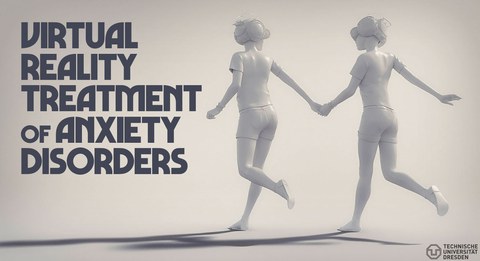VRAD - Virtual reality treatment of anxiety disorders
Inhaltsverzeichnis
Project Summary
The goal of the project is to develop and evaluate novel VR-based therapies in real therapeutic relationships.
This involves two components: a VR software framework tailored for rapid creation of individualized therapeutic environments for novel VR therapies, and a collaboration platform between practicing therapists and VR engineers.
The outcome is a framework encompassing the following key elements:
- Rapid creation and variation of immersive virtual scenarios tailored to the specific needs and context of the patient. We strive to equip psychotherapists with the tools and skills to author patient-tailored virtual scenarios, without the need of large teams of software developers and 3D artists.
- Skills and know-how. Development of VR therapy simulations still depends on the input of developers and therapists with specific skills. Hence, we bring together practicing psychotherapists and VR engineers to understand the capabilities of our in-house open-sourced software, and equally understand the wishes and requirements of the therapists.
- Workshops to bring together practicing psychotherapists and psychotherapy students with VR experts, Helping us to build a framework that understands their needs.
- Shared virtual experiences, in which therapists can accompany patients inside the virtual world.
- Integration of translational findings on inhibition learning and fear extinction into virtual exposure, to enable therapists to maximize long-term treatment effects.
Project Aims
In this project, we employ novel interaction methods and cutting-edge generative AI models to create low-effort means of tailoring exposure therapy sessions to the patients individual cases, while remaining focussed on their patients.
Building upon our open-sourced framework for the rapid creation of co-located multi-user VR and mixed reality experiences "ViewR" allows us to focus on the therapists needs and requirements. Through ViewR, we can bring both, the patient and the therapist, into a shared virtual environment and have them interact naturally with their environment and with one another.
Utilizing this, we are able to facilitate exposure therapy sessions that resemble real-world exposure therapy pracitces closer than concurrent single-user VR experiences, (hopefully) improving the likelihood of adoption and hence the therapy outcomes for the patients. Using additional features, such as eyetracking and unintrusive physiological sensors, we can even extend the reality-like therapies, and give the therapists additional live-insights.
Clinical Need
Anxiety disorders are the most prevalent mental disorders, with 12-month-prevalence estimates of 14% worldwide and 15.3% in Germany. Even though considered the gold-standard treatment for specific phobias and other anxiety disorders, exposure therapy is only applied in less than 50% of the cases with a clear treatment indication. Practitioners report reservation towards exposure therapy due to a number of practical, systemic, and other perceived implementation barriers. The use of virtual reality in this treatment domain promises several advantages addressing these barriers, potentially facilitating the conduct of exposure for psychotherapists (e.g. reduced travelling time and flexible adjustment of exposure stimuli). Yet, current software solutions are relatively inflexible, development intensive and usually focus on the patient as primary user.
Applications
- ViewR
Scientific Events, Exhibitions and Science Communication Efforts
- LNdW 2022
- EKFZ InnoDays 2022
- Würtual Reality XR Meeting 2023
- EKFZ Projectcafé 2023
- Offenes Regierungsviertel 2023
- VRAD team präsentiert bei den EKFZ InnoDays 2023
- AI in Medicine: Bridging Bytes and Bedside, 2023
- Florian Schier & Daniel Badeja present VRAD at SPIN2030
- Florian Schier presents ViewR at IEEE VR 2024
- VRAD Team hosts Workshop on MR for Psychotherapy
-
Promoting MINT: IXLAB invites students to Girls'Day 2024 with VRAD-experiences
Videos
ViewR Supplemental Material: DOI
Selected Publications
ViewR: Architectural-Scale Multi-User Mixed Reality with Mobile Head-Mounted Displays DOI: 10.1109/TVCG.2023.3299781 [Paper] | [Code]
Student Theses and Projects
Theses
- First time VR experience: An exploratory study of personality traits influencing the range of reactions to first time exposure to the plank experience. Mariam Sayed. FIS.
- Motion Capture Animations Made Responsive - Envoronment-Aware Dynamic Real-Time Blending of Humanoid Character Movements in Virtual Reality. Artém Bykov.
- Design and Validation of a Composite Fear Score from Physiological Signals in Virtual Extreme-Heights Scenarios. David Leistner.
- Networked Real-Time Physics for Unity XR Projects: A Comparison of Object-Orientated and Component-Based Architectures. Florian Demmler.
- EXOFVR (P): Effects of Experience on Fear in Virtual Reality - A Pilot. Daniel Hauck.
- Investigating the 'Worry Gallery': A Mixed Reality Paradigm Leveraging Generative AI for Personalized Exposure Interventions. Hans-Christian Straka.
- Are you scared? Untersuchung einer KI-gestützten Mixed-Reality-Methode zur Angstinduktion anhand physiologischer Erregungsparameter bei gesunden Erwachsenen. Marie-Christin Nelles.
Research Projects
- BioSignals derived Fear Score. David Leistner.
- VR Interactions in an Exposure Therapy Application. Moritz Starke.
- 3rd Person Out Of Body Experience Effect. Mücella Cetinkaya.
- Biosignal Visualization. Nico Müller.
Project Team Members
|
Clinician |
High-tech |
|
|
Partners & Funding
VRAD receives funding through the EKFZ for Digital Health under Grant #061.2024.
VRAD is a collaboration between
|
Chair of Behavioral Psychotherapy |
Chair of Immersive Media Design, Immersive Experience Lab (IXLAB) Institute of Software and Multimedia Technology Faculty of Computer Science TU Dresden |
Links
VRAD @ EKFZ for Digital Health
Let's Talk!
Curious to learn more? | Interested in collaboration opportunities? | Student looking for an interesting thesis topic?
Please reach out to Florian Schier and Daniel Badeja.
We’d love to hear from you!

